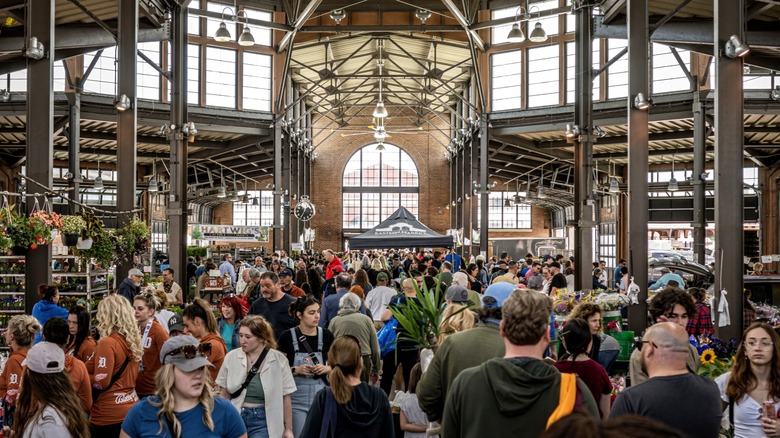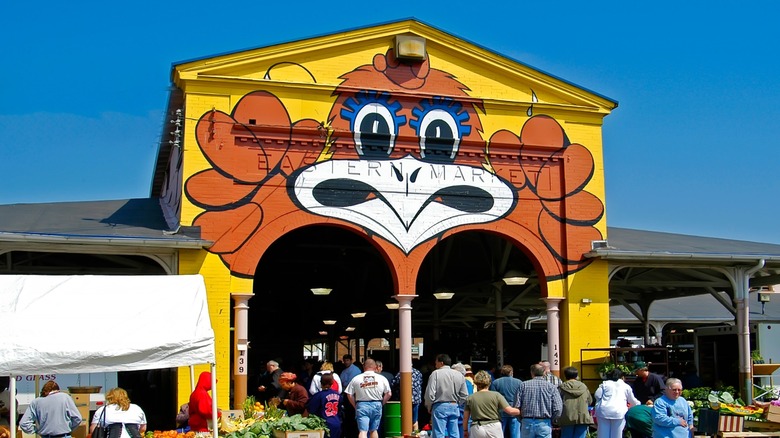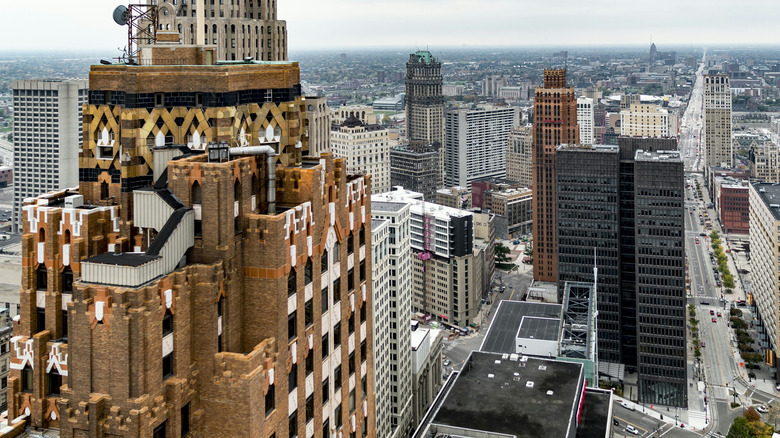America's Largest Historic Public Market Is A Midwest Hub Of Fresh Food, Art, And Unique Local Goods
Detroit has long had a troubled reputation, but the old motor town — once among the richest cities in the country — has steadily reclaimed some of its former glory in neighborhoods such as Lafayette Park and the under-the-radar Canal District known as "Little Venice." In various neighborhoods in Detroit, you'll find boutique hotels, fashionable restaurants, craft beer breweries, and artisanal delis. But one thing that really makes Detroit stand out is the Eastern Market, a multi-purpose commercial center selling numerous wares, from fruit and vegetables to handcrafted goods, fresh meat, seafood, spices, and baked treats.
As one of the largest markets in the country, the 43-acre shopping center comes alive, packed with locals and out-of-towners perusing the open-air stalls, bartering, sampling, and shooting the breeze with vendors. While the market was established in 1842, it's been in its current location since 1891. Beyond the bustling shopping mecca, the streets blend old brick facades with sleek modern renovations, reflecting Detroit's ongoing transformation.
Detroit's Eastern Market features seasonal community goods
Detroit's Eastern Market is not open all day, every day, like some of the world's biggest vendors, such as Khan al-Khalili, Cairo's bustling historic bazaar. Instead, Eastern Market has different offerings throughout the week, depending on the season. It is open year-round on Saturdays from 6 a.m. to 4 p.m. The Saturday market hosts over 225 vendors and caters to up to 45,000 visitors during peak season, who flock to the market for local meat, baked goods, and fresh produce.
The Sunday market is similarly buzzing, with the focus being local art, food, jewelry, music, and other artisanal goods. This market is open 10 a.m. to 4 p.m. from June through September. The Tuesday market is also active from June through September, open from 9 a.m. to 3 p.m. It hosts much of the same goodness found on Saturdays, only with the addition of free yoga and Zumba classes running 11 a.m and 1 p.m., respectively.
For a better understanding of the Eastern Market, stop by the welcome center — open year-round and seasonally — where you can ask questions, collect maps and recipes, and inquire about the Bridge Card, which regulars can use to acquire tokens to spend with participating vendors.
Detroit, a city on the up
A reputation for violence and decay has plagued Detroit for decades. However, while crime remains a problem in Michigan's largest city, Detroit has also emerged as one of the Midwest's best new art cities. In addition to the arts, crafts, and artisanal wares of Eastern Market, Detroit is home to a dynamic range of stylish establishments across its Downtown, Midtown, Hamtramck, and Cass Corridor neighborhoods.
If you land at Detroit Metropolitan Wayne County Airport, the heart of the downtown area is a 30-minute bus ride away. If it is boutique shops you're interested in, head for Parker's Alley, a brick-paved lane lined with independent shops such as the Lip Bar, a make-up favorite; Posie Atelier, a florist and jeweler; and Pingree Leather Goods, a purveyor of bags and boots. Just south of Parker's Alley is the Woodward Esplanade, where you will find buzzing restaurants such as Texas de Brazil, a steakhouse with thousands of positive Google reviews. Just off the Esplanade is a popular brunch spot named the Dime Store, beloved for its eggs, bacon, French toast, and other breakfast classics.
Those seeking a local, less gentrified ambiance should visit Midtown, the neighborhood arguably plays the biggest role in Detroit's growing reputation as an artsy hub. From merchants like Detroit Denim Co. and Source Booksellers to eateries such as Rocco's Italian Deli, Motor City Brewing Works, and the Whitney — Midtown may have the strongest claim to Detroit's cultural heart.


